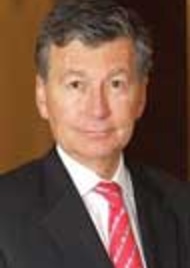By: Reed Hundt with Ron Pernick

Part of a series of insights from leading smart-grid, clean-energy, and utility experts speaking at gridCONNEXT 2017 in Washington DC, December 4-6. Questions asked by Clean Edge managing director and gridCONNEXT co-chair Ron Pernick.
Ron Pernick: While you were the chairman of the FCC, President Bill Clinton signed the 1996 Telecommunications Act into law (more than a decade after the breakup of AT&T). While the telecom industry and electricity sectors have their differences, in your experience, what lessons might today’s energy sector learn from earlier telecom deregulation?
Reed Hundt: Electricity is the only sector that lacks a national funding plan for low-income and high-cost customers. That’s something Congress should fix; states should not be on their own in this respect. In addition, all states should be obliged to open their markets fairly to DER installations. The variation and in some cases closure of markets harms jobs, hurts consumers, and decreases investment.
Pernick: I know dozens of other people, like you, who have transitioned from telecom and/or the internet to the clean-energy sectors (myself included). Any sense of what might be behind this seemingly natural affiliation/transition?
Hundt: Both sectors are regulated similarly at the state level. Both involve EMFs over distribution networks that have monopoly characteristics. Both are the essential platforms for modern life.
Pernick: The Trump Administration is pushing for a strategy that rewards “baseload” sources like coal and nuclear over renewables. What’s your take on this approach?
Hundt: Backward looking.
Pernick: 4G, 5G, and cloud services are poised to reinvent the way we do many different things. What impact do you believe these telecom innovations will have on the grid of the future (from smart meters to EVs)?
Hundt: In particular, 5G is the likely version of wireless for self-driving cars, one of which I was in (you don’t say ‘drove’) two weeks ago. Way cool. States and municipalities need to plan now to construct the networks that will facilitate huge savings from avoided crashes and from reorganizing all traffic patterns. Think: no more stop signs or stop lights…really!
Now if one million self-driving cars in California were used as shared vehicles (like Lyft or taxis) – and why wouldn’t they be used that way – then they would account for one half of all driven miles per year. The result would be an increase of 8% in revenue from the sale of electricity. That money would make utility shareholders pretty happy, and would support the necessary investments in upgrading the distribution networks.
Pernick: At the Coalition for Green Capital you've been leading the charge towards the financing of clean energy through vehicles like green banks. How might these financing structures (and perhaps other similar financing tools) be used to build out smart grid infrastructure?
Hundt: There needs to be, and there is emerging, a consortium of local and state green banks, with our Coalition as an organizer, and money center funders like the New York Green Bank, I hope, as wholesale finance providers. Smart grids are one of the major platforms that this consortium should offer to finance. Low cost finance mean upgrades in platforms without punishing consumers by inflicting higher rates on them.
About Reed Hundt and gridCONNEXT
Reed E. Hundt is the CEO of the Coalition for Green Capital, a non-profit headquartered in Washington, D.C. He is currently an adviser to the Covington law firm, and on the boards of various corporate and non-profit boards, including Intel Corporation, Smart Sky Networks, and the Connecticut Green Bank. He was chairman of the Federal Communications Commission from 1993 to 1997. His publications include Zero Hour: Time to Rebuild the Clean Power Platform (Odyssey Editions, 2013), The Politics of Abundance: How Technology Can Fix the Budget, Revive the American Dream, and Establish Obama’s Legacy, an e-book co-authored with Blair Levin (Odyssey Editions, 2012), In China’s Shadow: The Crisis of American Entrepreneurship (Yale University Press, 2006) and You Say You Want A Revolution: A Story of Information Age Politics (Yale University Press, 2000). He and his wife Betsy live in Chevy Chase, MD.
gridCONNEXT, scheduled for December 4-6 in Washington, DC, is hosted by Clean Edge and GridWise Alliance. The conference provides an unprecedented opportunity for utilities, policymakers, regulators, investors, businesses, service providers, end-users, and other stakeholders to explore policies and share best practices on building a modern 21st century grid. For more information, visit www.gridconnext.com.

